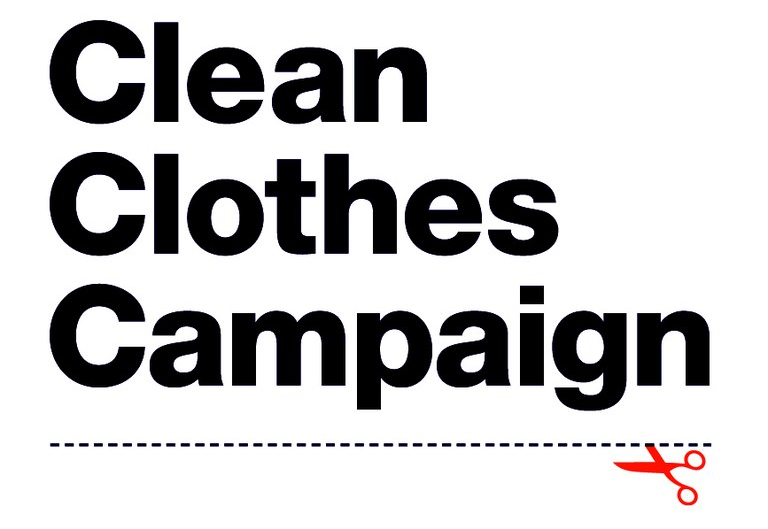Search results
12 results
Sort by:
Global living wage campaign for Cambodia kicks off
On the first day of a wave of international actions, Clean Clothes Campaign announces its support for the demand of a coalition of Cambodian unions that the multinational brands must ensure a minimum wage of US $177. Today, thousands of women and men in Cambodia and around the world, will wear stickers saying “brands must provide a living wage for workers!” in factories which produce apparel for major global brands such as H&M, Inditex, Levi's and GAP.
Global brands leave Cambodian workers fainting over fashion
On International Human Rights Day, labour network Clean Clothes Campaign joins more than 25 countries in a global call on major brands such as H&M, GAP, Levi's and Inditex to make sure Cambodian workers receive US$177 as a first step towards a living wage.
CCC condemns escalating repression of unionists amid wage strikes Bangladesh
Clean Clothes Campaign (CCC) is today raising concerns about the safety of trade union leaders and workers in Bangladesh, after a number of labour activists and workers were arrested on apparently arbitrary grounds. The arrests have come in the wake of a week of unrest, as thousands of workers in the Ashulia area of Dhaka went on strike to demand higher wages.
Bangladeshi garment workers face mass firings and criminal charges
Since last month's wage protests began in Dhaka, Bangladesh thousands of workers along with several grass-roots worker organizations located in the region faced a series of repressive actions from their employers and the government. An estimated 2 - 3000 workers were fired, while numerous legal cases filed at the Ashulia police station accuse at least 1,500 unnamed workers and 150 named workers of vandalism, looting, threatening other workers, and assaulting factory officials. At least 13 union leaders and activists, many of whom had no association with the protests, were detained or arrested. As of January 4, 2017, at least 11 remain in police custody.
Brands must intervene to win release of imprisoned labour leaders in Bangladesh
Twenty-two human and labour rights organizations from around the world are calling on H&M, C&A, Inditex, Gap and VF to press for the release of unjustly imprisoned Bangladeshi union leaders and worker rights advocates and the reinstatement of 1,500 workers suspended or terminated for taking part in a wage strike. Sign the petition!
How Inditex usurps the word ‘Respect’
The fashion giant Inditex, which owns the brand Zara, presents itself as a transparent company that attaches the utmost importance to the people who produce its clothes. Exclusive investigation into the conditions in which one of its iconic hoodies was produced reveals what goes on behind the scenes: meagre wages, excessive hours, precarious contracts. The workers pay the price for the huge pressure to drive down prices that Inditex exerts on its suppliers in order to boost its handsome profits.
First time victory: Romanian workers stitching European brands win withheld wages during COVID-19
A group of workers in Romania received their full back wages after an intense media campaign went viral. During the first months of the pandemic, they received 140 EUR, just over half of their regular monthly wage. The Clean Clothes Campaign (CCC) network and supporters put pressure on Inditex, Holy Fashion and a UK high street brand: three companies sourcing from the Tanex facility. International pressure led these brands to take responsibility to settle the violations between the management and the workers.
Myanmar union busting win after months of struggle
In a significant step for the Myanmar labour movement, workers at the Rui-Ning factory, producing for Inditex (Zara), Mango, Bestseller and Swiss brand Tally Weijl, are celebrating the signing of an agreement between the union, factory management and Inditex, regarding worker reinstatement and re-hiring following union busting.
Zara must not walk away from safety agreement while workers remain at risk sewing its clothes
A new brief, published by labour rights groups ahead of Inditex’s shareholder meeting of 13 July, shows that the company urgently needs to sign a new binding agreement on factory safety in Bangladesh before the current programme runs out on 31 August 2021. The Accord on Fire and Building Safety in Bangladesh, the most successful safety programme in the contemporary history of apparel supply chains, has enabled great progress, but Inditex must not ignore the deadly hazards that remain.
Campaign groups call on Inditex to stop airborne fashion
Inditex, the parent company of brands such as Zara, is continuing to transport huge volumes of fast fashion items by air, causing considerable damage to the climate. In 2023, its transport-related CO2 emissions increased by 37%, reaching an all-time high. As the company’s management is ignoring a call by more than 26,000 people for it to change its course, Public Eye, Clean Clothes Campaign and other campaign groups are now turning to the shareholders of the Spanish fast-fashion group.
From moral responsibility to legal liability? - A report on Inditex/Zara in Brasil
This research report from May 2015 exposes Zara’s dodgy legal strategy to avoid liability for Brazilian labour rights abuses. In 2011, Brazilian inspectors found cases of modern-day slavery in Zara’s supply chain. After the scandal, Zara promised improvements by monitoring its supply chain more closely. The new inspection findings and the research report reveal that Zara is not living up to the agreements made with the Brazilian authorities at that time.
Zara's Unfinished Business
This brief by witness signatories to the Accord on Fire and Building Safety in Bangladesh, published in July 2021, looks at the progress rate of safety remediation in Inditex supplier factories in Bangladesh and identified outstanding deadly safety risks at those factories.
